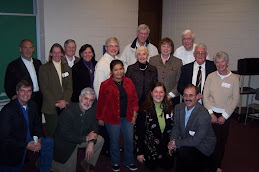By Fr. Peter Daly, Nov. 5, 2012 Parish Diary
 Fr. Peter Daly is a priest at the Archdiocese of Washington, D.C., and has been pastor of St. John Vianney parish in Prince Frederick, Md., since 1994.
Fr. Peter Daly is a priest at the Archdiocese of Washington, D.C., and has been pastor of St. John Vianney parish in Prince Frederick, Md., since 1994.
Our Catholic bishops started out leading a political parade in the spring. But when they looked behind them in the fall, they discovered that almost nobody was following. What happened?
A few groups got in line. The Knights of Columbus were very active. EWTN had several programs devoted to Fortnight. There were some rallies around the country. A lot of money was spent on pamphlets and videos. There was an opening Mass in Baltimore and a closing Mass in Washington, D.C. But there was hardly any talk about it in the pews. The average Catholic hardly even noticed a Fortnight for Freedom was happening.
Why didn't this movement catch fire? Four reasons, I think.
First, perhaps some of our language was hyperbolic. When language is perceived as exaggerated, it is not taken seriously.
Bishops and Catholic publications used words like "alarming," "unprecedented" and "unconscionable" about the HHS mandate. But most people did not see it as an existential threat to our religious liberty. They saw it as a disagreement over government policy.
Everybody exaggerated, not just the church.
Conservatives like newly minted Catholic Newt Gingrich accused the Obama administration of "waging war on religion." Liberals, like the talking heads on MSNBC, accused the Republican Party of waging "war on women." Neither side really believed its own rhetoric.
Second, the statement that this was unprecedented was not historically accurate.
Bishops said that never before had people been required to violate their religious conscience to comply with the law. But every day, we tax Quakers and other religious pacifists to support wars. Jehovah's Witnesses pay Medicare taxes for blood transfusions. Seventh-day Adventists in the military must report to duty on Saturdays. Mormons had to give up their cherished practice of polygamy as the price for bringing Utah into the Union. The fact is that religious liberty has never been absolute.
Third, the Catholic church is not a convincing defender of religious liberty because of our own history.
The church only very recently came to accept religious liberty. For most of its history, the Catholic church vigorously opposed freedom of religion. Pope Pius IX and his Syllabus of Errors, issued in 1859, condemned freedom of religion and said "error has no rights." That is why Protestants were so fearful at the prospect of the election of a Catholic in 1960. It was not until five years later, in 1965, that the church accepted religious liberty at the Second Vatican Council in its declaration Dignitatis Humanae. The church did an about-face and accepted what it had heretofore condemned.
In recent years, Catholics have not been consistent defenders of the religious liberty. For example, when Muslims sought to build a recreation center with a mosque near ground zero in New York, we did not defend their right to do so. Cardinal Timothy Dolan suggested they move elsewhere.
Fourth, the Fortnight for Freedom was perceived as a partisan effort to influence the election.
The bishops, of course, did not intend to be partisan and vociferously denied that they were partisan, but both sides of the political equation perceived "Fortnight" as an effort to defeat President Barack Obama. I went to one Knights of Columbus meeting that ended with a blunt appeal to "get behind our bishops" and defeat the president.
Although the many bishops were unified on "Fortnight," the faithful were not. Catholics simply don't agree on what policies we should follow. Witness the two vice presidential candidates, Joe Biden and Paul Ryan.
In my parish, we held a discussion on five religious liberty issues: gay marriage; the HHS mandate and the definition of religious organizations; immigration; prayer in public forums; and abortion. We had about 100 people participate. We could not agree on a single public policy for any of the five issues. If Catholics talking among themselves cannot agree, how can we lead a political movement?
The main issue was the HHS regulation's requirement that all insurance policies provided by private employers should cover contraception. The big problem was, and still is, that the religious exemption was too narrowly drawn. I spoke about the HHS mandate and unequivocally called upon the Obama administration to reverse its position. I got a fair amount of criticism from both sides. Some thought I did not hit hard enough; others thought I hit it too hard. Most said nothing. Obviously, we do not agree.
Some people feel the problem is that many of our institutions are not really Catholic. Their religious identity is weak or gone.
Many of our hospitals are now owned by large secular systems or even hedge funds. Georgetown University Hospital in Washington, D.C., for instance, is owned by a large secular chain, MedStar.
Catholic Charities in most dioceses are principally funded by government contracts and grants, not by the church. It is Caesar's coin that pays the bills.
Our universities and colleges rely on government grants and student loans, not the church. Most of our institutions of higher learning are only vestigially Catholic, as George Weigel once put it.
What are the lessons learned from "Fortnight"? As a pastor, I can see three.
First, let the laity lead. It is the laypeople who have competence in the secular world. That is the church's own teaching at Vatican II in Lumen Gentium, No. 33. Laypeople are the ones called to be salt of the earth and light for the world.
Second, tone down the rhetoric a bit. Our policy disputes are not an existential threat to religion. Our statements have to be accurate and narrowly drawn.
Third, educate the church first before you blow the bugle to line up the troops.




